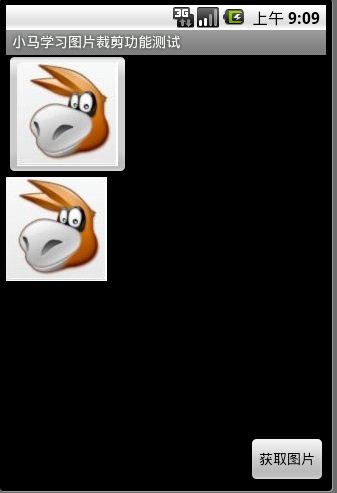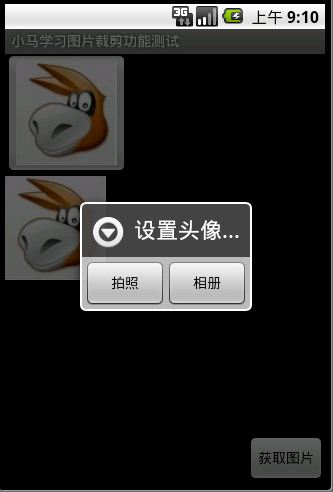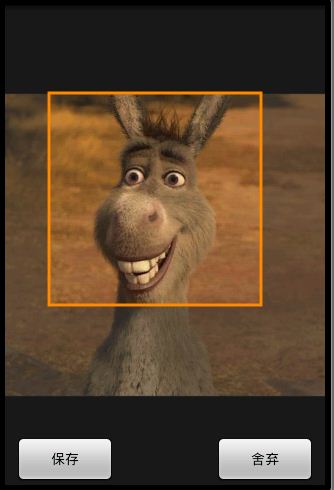原创作品,允许转载,转载时请务必以超链接形式标明文章
原始出处 、作者信息和本声明。否则将追究法律责任。
http://mzh3344258.blog.51cto.com/1823534/808837
- package com.xiaoma.piccut.demo;
- import java.io.File;
- import android.app.Activity;
- import android.app.AlertDialog;
- import android.content.DialogInterface;
- import android.content.Intent;
- import android.graphics.Bitmap;
- import android.graphics.drawable.BitmapDrawable;
- import android.graphics.drawable.Drawable;
- import android.net.Uri;
- import android.os.Bundle;
- import android.os.Environment;
- import android.provider.MediaStore;
- import android.view.View;
- import android.view.View.OnClickListener;
- import android.widget.Button;
- import android.widget.ImageButton;
- import android.widget.ImageView;
- /**
- * @Title: PicCutDemoActivity.java
- * @Package com.xiaoma.piccut.demo
- * @Description: 图片裁剪功能测试
- * @author XiaoMa
- */
- public class PicCutDemoActivity extends Activity implements OnClickListener {
- private ImageButton ib = null;
- private ImageView iv = null;
- private Button btn = null;
- private String tp = null;
- /** Called when the activity is first created. */
- @Override
- public void onCreate(Bundle savedInstanceState) {
- super.onCreate(savedInstanceState);
- setContentView(R.layout.main);
- //初始化
- init();
- }
- /**
- * 初始化方法实现
- */
- private void init() {
- ib = (ImageButton) findViewById(R.id.imageButton1);
- iv = (ImageView) findViewById(R.id.imageView1);
- btn = (Button) findViewById(R.id.button1);
- ib.setOnClickListener(this);
- iv.setOnClickListener(this);
- btn.setOnClickListener(this);
- }
- /**
- * 控件点击事件实现
- *
- * 因为有朋友问不同控件的背景图裁剪怎么实现,
- * 我就在这个地方用了三个控件,只为了自己记录学习
- * 大家觉得没用的可以跳过啦
- */
- @Override
- public void onClick(View v) {
- switch (v.getId()) {
- case R.id.imageButton1:
- ShowPickDialog();
- break;
- case R.id.imageView1:
- ShowPickDialog();
- break;
- case R.id.button1:
- ShowPickDialog();
- break;
- default:
- break;
- }
- }
- /**
- * 选择提示对话框
- */
- private void ShowPickDialog() {
- new AlertDialog.Builder(this)
- .setTitle("设置头像...")
- .setNegativeButton("相册", new DialogInterface.OnClickListener() {
- public void onClick(DialogInterface dialog, int which) {
- dialog.dismiss();
- /**
- * 刚开始,我自己也不知道ACTION_PICK是干嘛的,后来直接看Intent源码,
- * 可以发现里面很多东西,Intent是个很强大的东西,大家一定仔细阅读下
- */
- Intent intent = new Intent(Intent.ACTION_PICK, null);
- /**
- * 下面这句话,与其它方式写是一样的效果,如果:
- * intent.setData(MediaStore.Images.Media.EXTERNAL_CONTENT_URI);
- * intent.setType(""image/*");设置数据类型
- * 如果朋友们要限制上传到服务器的图片类型时可以直接写如:"image/jpeg 、 image/png等的类型"
- * 这个地方小马有个疑问,希望高手解答下:就是这个数据URI与类型为什么要分两种形式来写呀?有什么区别?
- */
- intent.setDataAndType(
- MediaStore.Images.Media.EXTERNAL_CONTENT_URI,
- "image/*");
- startActivityForResult(intent, 1);
- }
- })
- .setPositiveButton("拍照", new DialogInterface.OnClickListener() {
- public void onClick(DialogInterface dialog, int whichButton) {
- dialog.dismiss();
- /**
- * 下面这句还是老样子,调用快速拍照功能,至于为什么叫快速拍照,大家可以参考如下官方
- * 文档,you_sdk_path/docs/guide/topics/media/camera.html
- * 我刚看的时候因为太长就认真看,其实是错的,这个里面有用的太多了,所以大家不要认为
- * 官方文档太长了就不看了,其实是错的,这个地方小马也错了,必须改正
- */
- Intent intent = new Intent(
- MediaStore.ACTION_IMAGE_CAPTURE);
- //下面这句指定调用相机拍照后的照片存储的路径
- intent.putExtra(MediaStore.EXTRA_OUTPUT, Uri
- .fromFile(new File(Environment
- .getExternalStorageDirectory(),
- "xiaoma.jpg")));
- startActivityForResult(intent, 2);
- }
- }).show();
- }
- @Override
- protected void onActivityResult(int requestCode, int resultCode, Intent data) {
- switch (requestCode) {
- // 如果是直接从相册获取
- case 1:
- startPhotoZoom(data.getData());
- break;
- // 如果是调用相机拍照时
- case 2:
- File temp = new File(Environment.getExternalStorageDirectory()
- + "/xiaoma.jpg");
- startPhotoZoom(Uri.fromFile(temp));
- break;
- // 取得裁剪后的图片
- case 3:
- /**
- * 非空判断大家一定要验证,如果不验证的话,
- * 在剪裁之后如果发现不满意,要重新裁剪,丢弃
- * 当前功能时,会报NullException,小马只
- * 在这个地方加下,大家可以根据不同情况在合适的
- * 地方做判断处理类似情况
- *
- */
- if(data != null){
- setPicToView(data);
- }
- break;
- default:
- break;
- }
- super.onActivityResult(requestCode, resultCode, data);
- }
- /**
- * 裁剪图片方法实现
- * @param uri
- */
- public void startPhotoZoom(Uri uri) {
- /*
- * 至于下面这个Intent的ACTION是怎么知道的,大家可以看下自己路径下的如下网页
- * yourself_sdk_path/docs/reference/android/content/Intent.html
- * 直接在里面Ctrl+F搜:CROP ,之前小马没仔细看过,其实安卓系统早已经有自带图片裁剪功能,
- * 是直接调本地库的,小马不懂C C++ 这个不做详细了解去了,有轮子就用轮子,不再研究轮子是怎么
- * 制做的了...吼吼
- */
- Intent intent = new Intent("com.android.camera.action.CROP");
- intent.setDataAndType(uri, "image/*");
- //下面这个crop=true是设置在开启的Intent中设置显示的VIEW可裁剪
- intent.putExtra("crop", "true");
- // aspectX aspectY 是宽高的比例
- intent.putExtra("aspectX", 1);
- intent.putExtra("aspectY", 1);
- // outputX outputY 是裁剪图片宽高
- intent.putExtra("outputX", 150);
- intent.putExtra("outputY", 150);
- intent.putExtra("return-data", true);
- startActivityForResult(intent, 3);
- }
- /**
- * 保存裁剪之后的图片数据
- * @param picdata
- */
- private void setPicToView(Intent picdata) {
- Bundle extras = picdata.getExtras();
- if (extras != null) {
- Bitmap photo = extras.getParcelable("data");
- Drawable drawable = new BitmapDrawable(photo);
- /**
- * 下面注释的方法是将裁剪之后的图片以Base64Coder的字符方式上
- * 传到服务器,QQ头像上传采用的方法跟这个类似
- */
- /*ByteArrayOutputStream stream = new ByteArrayOutputStream();
- photo.compress(Bitmap.CompressFormat.JPEG, 60, stream);
- byte[] b = stream.toByteArray();
- // 将图片流以字符串形式存储下来
- tp = new String(Base64Coder.encodeLines(b));
- 这个地方大家可以写下给服务器上传图片的实现,直接把tp直接上传就可以了,
- 服务器处理的方法是服务器那边的事了,吼吼
- 如果下载到的服务器的数据还是以Base64Coder的形式的话,可以用以下方式转换
- 为我们可以用的图片类型就OK啦...吼吼
- Bitmap dBitmap = BitmapFactory.decodeFile(tp);
- Drawable drawable = new BitmapDrawable(dBitmap);
- */
- ib.setBackgroundDrawable(drawable);
- iv.setBackgroundDrawable(drawable);
- }
- }
- }
- package com.xiaoma.piccut.demo;
- /**
- * 下面这些注释是下载这个类的时候本来就有的,本来要删除的,但看了下竟然是license,吼吼,
- * 好东西,留在注释里,以备不时之用,大家有需要加license的可以到下面的网址找哦
- */
- //EPL, Eclipse Public License, V1.0 or later, http://www.eclipse.org/legal
- //LGPL, GNU Lesser General Public License, V2.1 or later, http://www.gnu.org/licenses/lgpl.html
- //GPL, GNU General Public License, V2 or later, http://www.gnu.org/licenses/gpl.html
- //AL, Apache License, V2.0 or later, http://www.apache.org/licenses
- //BSD, BSD License, http://www.opensource.org/licenses/bsd-license.php
- /**
- * A Base64 encoder/decoder.
- *
- * <p>
- * This class is used to encode and decode data in Base64 format as described in RFC 1521.
- *
- * <p>
- * Project home page: <a href="http://www.source-code.biz/base64coder/java/">www.source-code.biz/base64coder/java</a><br>
- * Author: Christian d'Heureuse, Inventec Informatik AG, Zurich, Switzerland<br>
- * Multi-licensed: EPL / LGPL / GPL / AL / BSD.
- */
- /**
- * 这个类在上面注释的网址中有,大家可以自行下载下,也可以直接用这个,
- * 公开的Base64Coder类(不用深究它是怎么实现的,
- * 还是那句话,有轮子直接用轮子),好用的要死人了...
- * 小马也很无耻的引用了这个网址下的东东,吼吼...
- * @Title: Base64Coder.java
- * @Package com.xiaoma.piccut.demo
- * @Description: TODO
- * @author XiaoMa
- */
- public class Base64Coder {
- //The line separator string of the operating system.
- private static final String systemLineSeparator = System.getProperty("line.separator");
- //Mapping table from 6-bit nibbles to Base64 characters.
- private static char[] map1 = new char[64];
- static {
- int i=0;
- for (char c='A'; c<='Z'; c++) map1[i++] = c;
- for (char c='a'; c<='z'; c++) map1[i++] = c;
- for (char c='0'; c<='9'; c++) map1[i++] = c;
- map1[i++] = '+'; map1[i++] = '/'; }
- //Mapping table from Base64 characters to 6-bit nibbles.
- private static byte[] map2 = new byte[128];
- static {
- for (int i=0; i<map2.length; i++) map2[i] = -1;
- for (int i=0; i<64; i++) map2[map1[i]] = (byte)i; }
- /**
- * Encodes a string into Base64 format.
- * No blanks or line breaks are inserted.
- * @param s A String to be encoded.
- * @return A String containing the Base64 encoded data.
- */
- public static String encodeString (String s) {
- return new String(encode(s.getBytes())); }
- /**
- * Encodes a byte array into Base 64 format and breaks the output into lines of 76 characters.
- * This method is compatible with <code>sun.misc.BASE64Encoder.encodeBuffer(byte[])</code>.
- * @param in An array containing the data bytes to be encoded.
- * @return A String containing the Base64 encoded data, broken into lines.
- */
- public static String encodeLines (byte[] in) {
- return encodeLines(in, 0, in.length, 76, systemLineSeparator); }
- /**
- * Encodes a byte array into Base 64 format and breaks the output into lines.
- * @param in An array containing the data bytes to be encoded.
- * @param iOff Offset of the first byte in <code>in</code> to be processed.
- * @param iLen Number of bytes to be processed in <code>in</code>, starting at <code>iOff</code>.
- * @param lineLen Line length for the output data. Should be a multiple of 4.
- * @param lineSeparator The line separator to be used to separate the output lines.
- * @return A String containing the Base64 encoded data, broken into lines.
- */
- public static String encodeLines (byte[] in, int iOff, int iLen, int lineLen, String lineSeparator) {
- int blockLen = (lineLen*3) / 4;
- if (blockLen <= 0) throw new IllegalArgumentException();
- int lines = (iLen+blockLen-1) / blockLen;
- int bufLen = ((iLen+2)/3)*4 + lines*lineSeparator.length();
- StringBuilder buf = new StringBuilder(bufLen);
- int ip = 0;
- while (ip < iLen) {
- int l = Math.min(iLen-ip, blockLen);
- buf.append (encode(in, iOff+ip, l));
- buf.append (lineSeparator);
- ip += l; }
- return buf.toString(); }
- /**
- * Encodes a byte array into Base64 format.
- * No blanks or line breaks are inserted in the output.
- * @param in An array containing the data bytes to be encoded.
- * @return A character array containing the Base64 encoded data.
- */
- public static char[] encode (byte[] in) {
- return encode(in, 0, in.length); }
- /**
- * Encodes a byte array into Base64 format.
- * No blanks or line breaks are inserted in the output.
- * @param in An array containing the data bytes to be encoded.
- * @param iLen Number of bytes to process in <code>in</code>.
- * @return A character array containing the Base64 encoded data.
- */
- public static char[] encode (byte[] in, int iLen) {
- return encode(in, 0, iLen); }
- /**
- * Encodes a byte array into Base64 format.
- * No blanks or line breaks are inserted in the output.
- * @param in An array containing the data bytes to be encoded.
- * @param iOff Offset of the first byte in <code>in</code> to be processed.
- * @param iLen Number of bytes to process in <code>in</code>, starting at <code>iOff</code>.
- * @return A character array containing the Base64 encoded data.
- */
- public static char[] encode (byte[] in, int iOff, int iLen) {
- int oDataLen = (iLen*4+2)/3; // output length without padding
- int oLen = ((iLen+2)/3)*4; // output length including padding
- char[] out = new char[oLen];
- int ip = iOff;
- int iEnd = iOff + iLen;
- int op = 0;
- while (ip < iEnd) {
- int i0 = in[ip++] & 0xff;
- int i1 = ip < iEnd ? in[ip++] & 0xff : 0;
- int i2 = ip < iEnd ? in[ip++] & 0xff : 0;
- int o0 = i0 >>> 2;
- int o1 = ((i0 & 3) << 4) | (i1 >>> 4);
- int o2 = ((i1 & 0xf) << 2) | (i2 >>> 6);
- int o3 = i2 & 0x3F;
- out[op++] = map1[o0];
- out[op++] = map1[o1];
- out[op] = op < oDataLen ? map1[o2] : '='; op++;
- out[op] = op < oDataLen ? map1[o3] : '='; op++; }
- return out; }
- /**
- * Decodes a string from Base64 format.
- * No blanks or line breaks are allowed within the Base64 encoded input data.
- * @param s A Base64 String to be decoded.
- * @return A String containing the decoded data.
- * @throws IllegalArgumentException If the input is not valid Base64 encoded data.
- */
- public static String decodeString (String s) {
- return new String(decode(s)); }
- /**
- * Decodes a byte array from Base64 format and ignores line separators, tabs and blanks.
- * CR, LF, Tab and Space characters are ignored in the input data.
- * This method is compatible with <code>sun.misc.BASE64Decoder.decodeBuffer(String)</code>.
- * @param s A Base64 String to be decoded.
- * @return An array containing the decoded data bytes.
- * @throws IllegalArgumentException If the input is not valid Base64 encoded data.
- */
- public static byte[] decodeLines (String s) {
- char[] buf = new char[s.length()+3];
- int p = 0;
- for (int ip = 0; ip < s.length(); ip++) {
- char c = s.charAt(ip);
- if (c != ' ' && c != '\r' && c != '\n' && c != '\t')
- buf[p++] = c; }
- while ((p % 4) != 0)
- buf[p++] = '0';
- return decode(buf, 0, p); }
- /**
- * Decodes a byte array from Base64 format.
- * No blanks or line breaks are allowed within the Base64 encoded input data.
- * @param s A Base64 String to be decoded.
- * @return An array containing the decoded data bytes.
- * @throws IllegalArgumentException If the input is not valid Base64 encoded data.
- */
- public static byte[] decode (String s) {
- return decode(s.toCharArray()); }
- /**
- * Decodes a byte array from Base64 format.
- * No blanks or line breaks are allowed within the Base64 encoded input data.
- * @param in A character array containing the Base64 encoded data.
- * @return An array containing the decoded data bytes.
- * @throws IllegalArgumentException If the input is not valid Base64 encoded data.
- */
- public static byte[] decode (char[] in) {
- return decode(in, 0, in.length); }
- /**
- * Decodes a byte array from Base64 format.
- * No blanks or line breaks are allowed within the Base64 encoded input data.
- * @param in A character array containing the Base64 encoded data.
- * @param iOff Offset of the first character in <code>in</code> to be processed.
- * @param iLen Number of characters to process in <code>in</code>, starting at <code>iOff</code>.
- * @return An array containing the decoded data bytes.
- * @throws IllegalArgumentException If the input is not valid Base64 encoded data.
- */
- public static byte[] decode (char[] in, int iOff, int iLen) {
- if (iLen%4 != 0) throw new IllegalArgumentException ("Length of Base64 encoded input string is not a multiple of 4.");
- while (iLen > 0 && in[iOff+iLen-1] == '=') iLen--;
- int oLen = (iLen*3) / 4;
- byte[] out = new byte[oLen];
- int ip = iOff;
- int iEnd = iOff + iLen;
- int op = 0;
- while (ip < iEnd) {
- int i0 = in[ip++];
- int i1 = in[ip++];
- int i2 = ip < iEnd ? in[ip++] : 'A';
- int i3 = ip < iEnd ? in[ip++] : 'A';
- if (i0 > 127 || i1 > 127 || i2 > 127 || i3 > 127)
- throw new IllegalArgumentException ("Illegal character in Base64 encoded data.");
- int b0 = map2[i0];
- int b1 = map2[i1];
- int b2 = map2[i2];
- int b3 = map2[i3];
- if (b0 < 0 || b1 < 0 || b2 < 0 || b3 < 0)
- throw new IllegalArgumentException ("Illegal character in Base64 encoded data.");
- int o0 = ( b0 <<2) | (b1>>>4);
- int o1 = ((b1 & 0xf)<<4) | (b2>>>2);
- int o2 = ((b2 & 3)<<6) | b3;
- out[op++] = (byte)o0;
- if (op<oLen) out[op++] = (byte)o1;
- if (op<oLen) out[op++] = (byte)o2; }
- return out; }
- //Dummy constructor.
- private Base64Coder() {}
- } // end class Base64Coder



























 2168
2168











 被折叠的 条评论
为什么被折叠?
被折叠的 条评论
为什么被折叠?








